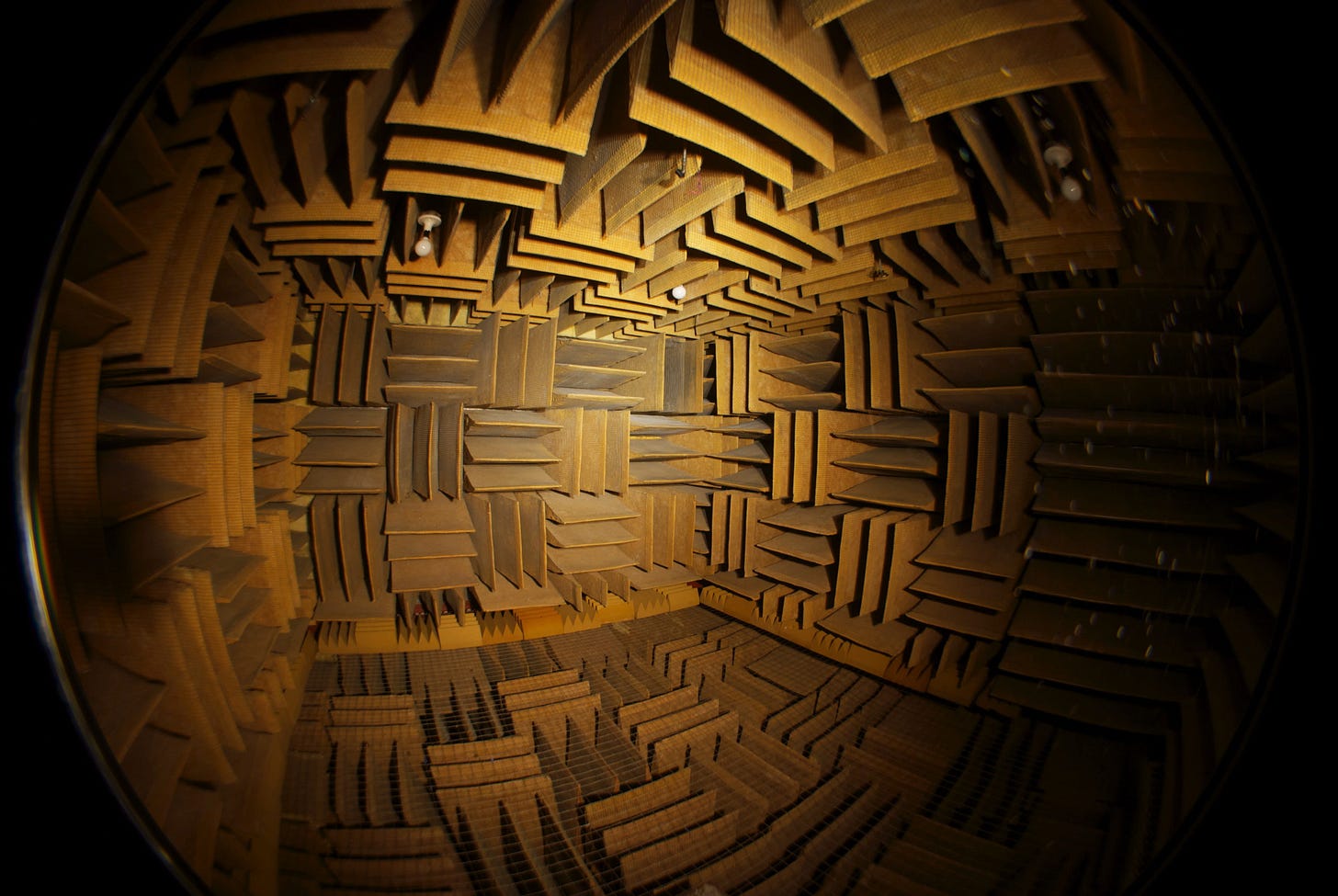Noise Pollution of the Soul
Rediscovering the holiness of silence in a Church that can't stop talking.
For a generation of overstimulated and spiritually starved Christians, embracing a practice of silence could be more needed and more transformative than even another sermon or devotional.
The quietest place on Earth is the anechoic chamber at Microsoft headquarters in Redmond, Washington.
It is so devoid of noise that you can hear blood flowing through your arteries and your muscle fibers contracting. Many of those who enter the chamber hear the bass of their heart-beating for the first time in their lives. The silence in this place is disorienting—most people can’t bear to be inside for more than a few minutes.
It's an uncanny parallel for how silence affects the soul.
Silence is revealing, uncovering. It shows us what is inside us, separate from all distraction and diversion. Its candor can also be terrifying. We have become so accustomed to existing in a constant hum of noise that the scrutiny of silence is unsettling.
Noise, on the other hand, is numbing and comforting. It anesthetizes us from our true selves. It excuses us from the vulnerability of facing our naked thoughts. The din of the world—the sound of traffic, the buzz of devices, the flickering of social media, the voices of other people—all muffle the sound of our own hearts. The louder the noise around us and within us, the less we know who we really are. Worse yet, the noise of the world is making us deaf to the voice of God.
But there is an innate, primal part of us that thirsts for silence. We linger in our cars for a while after a stressful day in the office. We are pleasantly soothed by the stillness of the house in the morning before TV’s, phones, and computers have begun babbling to us. We savor the sacred quiet when the baby finally falls asleep.
Our souls need silence like our skin needs sunlight. Without silence we cannot hear the whispers and groans of God’s spirit or our own. And for a generation of overstimulated and spiritually starved Christians, embracing a practice of silence could be more needed and more transformative than even another sermon or devotional.
Noise Pollution
External noise pollution—the kind our ears hear—is making us sick. Beyond just damaging our hearing, noise pollution can hamper the quality of our sleep and contribute to high blood pressure and heart disease. Children who live in noise-filled environments suffer from impaired memory and reduced reading levels.
The noise pollution inside our minds is even worse. The hazards of consuming social media—its own kind of cacophony—are widely known, but aren't seeming to deter us from it. Our mental health crisis is fueled by the chatter of self-obsessed ruminations.
Most insidiously, even the things we view as godly could be adding to the noise that's numbing us.
Ruth Haley Barton, in her "Invitation to Solitude and Silence," warns of the disproportionate fixation on words within the evangelical tradition compared to all others. We are a verbal church. Worshipping God has become synonymous with singing songs. Prayer is reduced to the words we say to God, and the words we hope He will say to us. The centerpiece of our services is a lengthy sermon, and therefore the eloquence of preachers has become the primary feature of our churches.
A study by the Pew Research Center found that sermons preached in evangelical churches average 5,938 words and last for an average of 39 minutes, roughly triple the length of Jesus’ longest message, the Sermon on the Mount.
In a culture of people obsessed with hearing themselves talk, it seems we have fallen right in line. Historic practices like meditation, stillness and solitude have been forsaken in favor of more and more words. What are we not hearing because we cannot stop talking?
Rediscovering the Sacredness of Silence
Jesus cautioned against the futility and pridefulness of bloating our prayers with too many words:
“And when you pray, do not keep on babbling like pagans, for they think they will be heard because of their many words. Do not be like them, for your Father knows what you need before you ask him.”
Matthew 6:7-8
He knew that filling our mouths and minds with words would leave us still starved for real meaning. But it was not just a warning against performative piety, it was also an invitation to surrender. Words bring us comfort, certainty, and a sense of control. But silence requires deep trust. It makes us lay down our arguments and explanations, and trust that God knows what we really need. It invites us to hear God in some deep place in us that knows a language other than words.
Silence has been part of the heritage of Christian spirituality for centuries. Mystics and spiritual leaders throughout history saw silence not as different from or opposed to prayer, but as an essential component of prayer. They knew that real prayer is not just an exchange of requests and blessings, or of questions and answers. They knew that real prayer requires being still and silent long enough to receive, to be healed, to be reformed.
But today, silence is nowhere to be found in our perfectly programmed gatherings, nor is it widely taught as the transformative spiritual discipline that it can be.
Our approach to discipleship seems to be based on dispensing and consuming as much information as possible, competing in the noise games of culture that we cannot win. We consume sermon clips and scripture in the same way we do TikTok. Way too much, way too quickly, with little retention or impact. No space to pause, reflect, digest, or truly hear. We’re hearing so much and internalizing so little.
In a noisy world that is becoming louder all the time, we will be most subversive with our silence. It is a fundamental kind of counter-formation in a society that has formed us to fill every space with sound. And it may just be the way back to ourselves. The truest you you’ll ever meet is the one you’ll find in silence, when the distraction and noise of the world has settled like sediment in water.
We know intuitively that there is a connection between our hearing and our seeing. It’s why we instinctively turn down the radio in our cars when we’re scanning for a parking space in a crowded lot. If we can lower the volume, we can see things that we’re missing in the midst of the noise. This is true most of all for our spiritual life. And sometimes the bravest act of faith we can make is to turn down the volume, be silent, and see what God is trying to show us.
“I need to be silent for a while. Worlds are forming in my heart.”
Meister Eckhart
Practices for Silence
Begin your day with 20 minutes of silence.
When you sit down to pray, start with silence.
After you read the Bible, sit in silence for a while.
Begin and end your sermons with silence.
Speak more slowly, more carefully, and pause between thoughts.
When someone else is speaking, listen. Really listen.
Drive without music, radio or podcasts once in a while.
A few times a year, spend a full day in solitude and silence.
Journal about how the silence affects you. Notice what makes it hard, notice how it helps, and notice who you are afterwards.
Make a silent retreat.






🙏🏻
So true. When my siblings and I were kids, and growing out of afternoon naps, my mom still enforced an afternoon ‘quiet time’ every day (probably just to hold onto her own sanity). You didn’t have to sleep, you could read or do a puzzle or play with whatever, but you had to be alone in your room and not make any noise, for at least an hour.
That ability to sit by myself in my own skin for an hour every day became my spiritual life. When parents ask me now how to raise their kids in faith, I tell them about ‘quiet time’ as the only truly necessary thing.